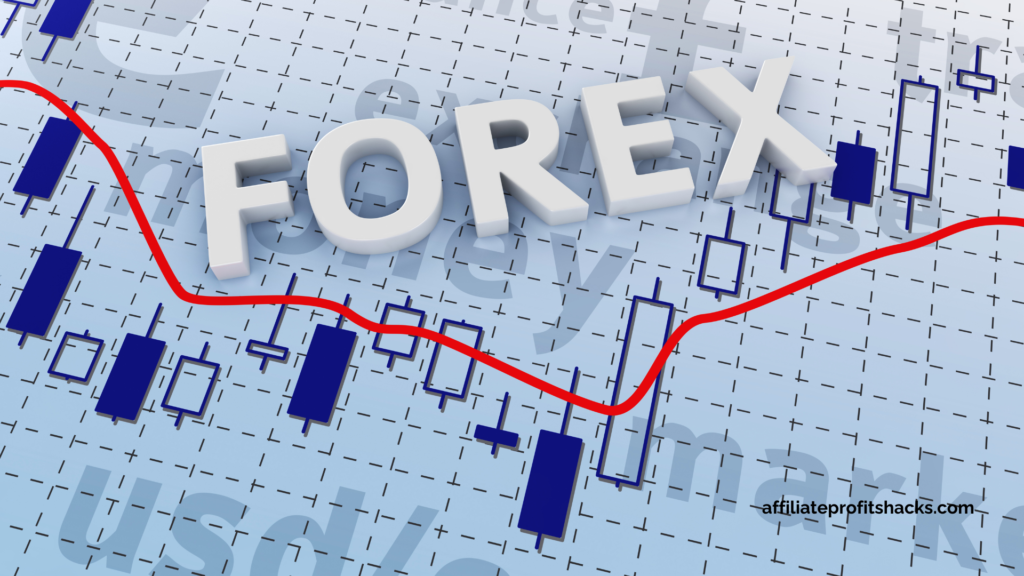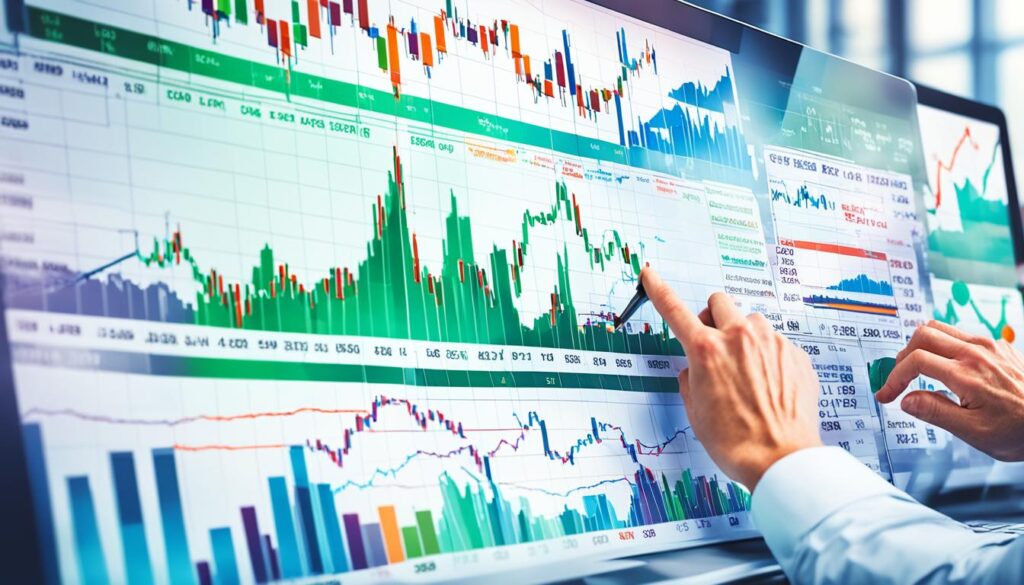Making Money with Forex Trading: Getting Started
Welcome to the world of forex trading!
If you’re looking for the best way to invest in forex and explore the potential of making money in the global currency market, you’ve come to the right place. This guide will take you through the basics of forex trading and show you how to start your journey to financial success.
Forex trading, or currency trading, is buying and selling currencies to make a profit. It’s an exciting and dynamic market that operates 24 hours a day, allowing you to trade at your convenience. With a daily global volume of $7.5 trillion, the forex market offers ample opportunities for traders to capitalize on fluctuations in exchange rates.
Best Recommended and Proven Way to Make Money Online – Click HERE for Instant ACCESS >>

To start your forex trading journey, it’s important to understand how the forex market works and familiarize yourself with the best forex brokers available. These brokers provide the tools and platforms to execute your trades effectively and efficiently.
Whether you’re a beginner or an experienced trader, this guide will equip you with the knowledge and strategies you need to succeed in forex trading. From setting up your forex trading account to developing a trading strategy and managing risk, we’ll cover all the essential aspects to help you confidently navigate the forex market.
So, let’s dive in and discover the world of forex trading and the endless possibilities it offers. Are you ready to embark on your forex trading journey? Let’s get started!
What is the Forex Market?
The forex market is where currencies are traded. It is a decentralized market without a central marketplace, and all transactions occur electronically via computer networks among traders worldwide. Currencies trade against each other as exchange rate pairs, such as EUR/USD, representing the euro against the U.S. dollar. The forex market is open 24 hours a day, five and a half days a week, and is active in major financial centers worldwide.
To better understand the forex market, imagine a global marketplace where different countries’ currencies are exchanged. Like any other market, the forex market operates based on the principles of supply and demand. The value of one currency is determined in relation to another currency, forming exchange rate pairs.
For example, if you believe the euro’s value will rise about the U.S. dollar, you can buy the EUR/USD exchange rate pair, hoping to sell it at a higher price. On the other hand, if you anticipate the euro’s value to decline, you can sell the EUR/USD pair, aiming to buy it back later at a lower price.
Trading in the forex market entails buying and selling currency pairs to make a profit. Traders aim to capitalize on fluctuations in exchange rates, which can be influenced by factors such as economic indicators, geopolitical events, and market sentiment. The forex market offers diverse trading opportunities, catering to traders with different strategies and risk appetites.
How Does the Forex Market Work?
The forex market operates as a spot (cash) and derivatives market. In the spot market, currencies are bought and sold based on their current trading price, which is determined by supply and demand and factors such as interest rates and economic performance. Traders participate in the spot market by exchanging one currency for another at the prevailing exchange rate. This market is characterized by immediate settlement, meaning that transactions are settled “on the spot,” with the delivery of the currency occurring within two business days.
In addition to the spot market, the forex market includes a derivatives market. In the derivatives market, forex traders can use various financial instruments such as forwards, futures, options, and currency swaps. These derivatives allow traders to speculate on the future movements of currency exchange rates or hedge against currency and interest rate risk. For example, a forex trader may enter into a forward contract to buy or sell a certain currency at a predetermined price on a future date.
The forex market’s spot and derivatives markets work together to provide liquidity and opportunities for traders to profit from currency fluctuations. Traders must understand markets and financial instruments to make informed trading decisions.
What is Forex Trading?
Forex trading is buying and selling currencies in the foreign exchange market to make a profit. It is a form of speculative trading that allows traders to take advantage of fluctuations in exchange rates to generate income.
One of the key features of forex trading is the ability to hedge against potential losses. Traders can use forex trading as a hedging strategy to protect their investments from adverse currency movements. By taking opposite positions in different currency pairs, traders can offset potential losses in one position with gains in the other.
Forex trading offers high liquidity, meaning many buyers and sellers are in the market anytime. This allows traders to enter and exit positions easily, ensuring they can execute their trades efficiently.
Leverage is another advantage of forex trading. With leverage, traders can control larger positions in the market with a smaller investment. This amplifies the potential profits but also increases the risk. Traders need to use leverage with caution and thoroughly understand the associated risks.
In addition, forex trading provides opportunities to capitalize on global economic and political events that impact currency prices. Traders can analyze economic indicators, news events, and government policies to make informed trading decisions.
However, forex trading requires knowledge, strategy, and risk awareness. Traders need to develop a solid understanding of technical analysis, fundamental analysis, and risk management. They need to continuously educate themselves about market trends, indicators, and trading strategies to improve their chances of success.
How to Start Trading Forex
To start trading forex, you need to follow a few key steps. First, learning about forex trading and gaining specialized market knowledge is essential. Understanding the basics will help you make informed trading decisions and develop effective strategies.
Next, you must establish a forex trading account with a reputable broker. Choosing the right broker is crucial to ensure the security and integrity of your funds. Look for a broker that is regulated, has a good reputation, and offers a user-friendly trading platform.
Starting with a demo account is highly recommended, especially for new traders. A demo account allows you to practice trading in a risk-free environment using virtual money. This is a great way to gain experience, test different strategies, and familiarize yourself with the trading platform.
When you feel comfortable and confident with your trading skills, you can start trading with a small investment. It’s important to begin with a conservative approach and gradually increase your trading activity as you gain more experience and knowledge of the market.
Lastly, to succeed in forex trading, it’s crucial to have emotional control and discipline. Emotions can often cloud judgment and lead to poor trading decisions. Developing a robust trading strategy and sticking to it, even during volatile market conditions, is key to long-term success.
Learn the Basic Forex Trading Terms
When it comes to forex trading, understanding the basic terms is crucial for effective communication with other traders and analyzing currency movements. Let’s explore some key terms that you need to familiarize yourself with:
Currency Pairs
In forex trading, currencies are traded in pairs. The major currency pairs are the most actively traded and include combinations like EUR/USD and GBP/USD. Minor currency pairs involve currencies from smaller economies, while cross and exotic currency pairs refer to less commonly traded combinations.
Bid and Ask
In any currency pair, there are two prices: the bid price and the ask price. The bid price represents the price at which you can sell the base currency, while the asking price is the price at which you can buy the base currency.
Spread
The spread is the difference between the bid and ask prices. It represents the cost of trading and is usually measured in pips, the smallest unit of price movement in forex trading.
Point in Price (Pip)
A pip is the smallest incremental change in a currency pair’s price. A pip is equivalent to 0.0001 for most currency pairs, but for pairs involving the Japanese yen, it is 0.01.
Best Recommended and Proven Way to Make Money Online – Click HERE for Instant ACCESS >>
Base and Quote Currency
In a currency pair, the first currency listed is the base currency, and the second is the quote currency. The exchange rate represents the value of the base currency in terms of the quote currency.
Lots
Lots refer to the standardized contract sizes used in forex trading. The three main types of lots are standard, mini, and micro-lots. The size of a lot determines the value of each pip movement in a trade.
By understanding these essential forex trading terms, you will be better equipped to navigate the dynamic world of currency trading. Now, let’s explore how to find a reputable Forex broker to start your trading journey.
Find a Reputable Forex Broker
When it comes to trading forex, choosing a reputable broker is paramount. A reputable broker ensures the secure handling of your funds and adheres to high ethical and financial standards. To find a trustworthy broker, consider several factors:
- Regulations: Opt for a broker regulated by recognized authorities such as the Financial Conduct Authority (FCA) or the Commodity Futures Trading Commission (CFTC). These regulatory bodies provide oversight and protect traders’ interests.
- Customer Reviews: Research customer reviews and ratings to gauge a broker’s reputation. Look for brokers with positive feedback, reliable customer support, and a record of resolving issues promptly.
- Trading Platforms: Assess the trading platforms offered by different brokers. Look for user-friendly platforms that provide comprehensive trading tools and features. A reliable trading platform is crucial for executing trades efficiently.
- Market Access: Consider the range of markets offered by the broker. Reputable brokers provide access to diverse markets, including major, minor, and exotic currency pairs. This allows you to capitalize on a wider range of trading opportunities.
- Low Trading Costs: Compare the trading costs among different brokers. Look for brokers that offer competitive spreads, low commissions, and minimal fees. Lower trading costs can significantly impact your profitability.
- Additional Resources: Some reputable brokers provide educational resources, research tools, and analysis reports to assist traders in making informed trading decisions. These additional resources can be valuable for both beginner and experienced traders.
You can find a reputable forex broker that aligns with your trading needs and preferences by carefully assessing these factors. Remember, the right broker can be crucial to your trading success.
Start With a Demo Account
Before diving into live forex trading, starting with a demo account is wise. A demo account allows you to practice trading without risking real money, providing a safe and risk-free environment to familiarize yourself with the forex market and trading platforms.
You can gain practical experience and understand how the forex market moves with a demo account. It allows you to test different trading strategies and see how they perform in real-time market conditions. Whether a novice or an experienced trader, a demo account is a valuable tool to refine your skills and experiment with new strategies.
A demo account also allows you to become familiar with the features and functionality of the trading platform. It allows you to navigate the platform, execute trades, and analyze market data without the pressure of using real money. Using a demo account, you can ensure you are comfortable with the platform before transitioning to live trading.
When using a demo account, it’s important to approach it as if you were trading with real money. Treat each trade seriously and analyze your performance objectively. Keep track of your trades, noting your entry and exit points, and evaluate the effectiveness of your trading strategy.
Remember, a demo account is a practice tool but should not be seen as an exact reflection of live trading conditions. The emotions and psychological factors in real-money trading are unique and can impact your decision-making process. Nonetheless, a demo account can significantly enhance your understanding and confidence in forex trading.
Once you feel comfortable and confident with your trading skills and strategies on the demo account, you can consider transitioning to live trading with a funded account. Until then, take advantage of the risk-free environment provided by a demo account to gain valuable experience and improve your chances of success in the forex market.
Begin With a Small Investment
It’s wise to begin with a small investment when starting your forex trading journey. By allocating a small amount of capital, you can effectively manage risk and gain valuable experience in live trading without putting significant money at stake.
Remember, forex trading carries inherent risks, and it’s essential only to invest what you can afford to lose. Starting with a small investment can minimize potential losses and protect your financial well-being.
You can gradually increase your investment as you gain proficiency and become more skilled in navigating the forex market. This approach allows you to grow your trading capital steadily while building confidence in your abilities.
One crucial aspect of forex trading is risk management. Setting proper risk parameters and avoiding excessive risks is vital, especially if you’re a beginner trader. By implementing risk management strategies, such as setting stop-loss orders and diversifying your portfolio, you can safeguard your investments and mitigate potential losses.
Remember, forex trading is a journey that requires continuous learning and practice. Starting with a small investment helps you manage risk and provides a platform for honing your trading skills and developing effective strategies.
Tips for Beginning with a Small Investment:
- Educate yourself about risk management techniques to protect your investment.
- Set realistic and achievable profit goals to track your progress.
- Use demo accounts to practice trading strategies before risking real money.
- Stay disciplined and control your emotions, avoiding impulsive or emotional trading decisions.
- Gradually increase your investment as you gain experience and profitability.
Starting with a small investment and implementing proper risk management strategies is a prudent approach to forex trading. By doing so, you can navigate the market more confidently and increase your chances of long-term success.
Learn Strategies to Help Maximize Trades
The right strategies in forex trading are essential to maximize your trades and increase profitability. By learning various trading strategies, including technical and fundamental analysis, you can make informed trading decisions and improve your chances of success.
Technical Analysis
One popular trading strategy is technical analysis. This approach involves studying charts, using indicators, and identifying patterns to predict future price movements. Technical analysts believe that historical price data can provide insights into market trends and help identify potential entry and exit points.
Best Recommended and Proven Way to Make Money Online – Click HERE for Instant ACCESS >>
Traders use tools and indicators to implement technical analysis, such as moving averages, trend lines, and oscillators. These tools help identify support and resistance levels, trend reversals, and market momentum. By analyzing these factors, traders can make more informed trading decisions.

Fundamental Analysis
Another important trading strategy is fundamental analysis. Unlike technical analysis, which focuses on price patterns, fundamental analysis looks at the underlying factors influencing a currency’s value. Traders using this approach study economic indicators, geopolitical events, and other factors that can impact a country’s economy and currency.
By analyzing economic data such as GDP, inflation rates, and interest rates, traders can make predictions about the future direction of a currency. For example, a country’s economy growing rapidly may lead to a stronger currency. On the other hand, if there are political uncertainties or economic challenges, it may weaken the currency.
Combining technical and fundamental analysis can provide a more comprehensive understanding of the forex market, helping traders make better decisions. It is important to stay updated on relevant news and economic events affecting currency movements.
Summary
- Technical analysis involves studying charts, indicators, and patterns to predict future price movements.
- Fundamental analysis focuses on economic indicators and geopolitical factors to predict currency movements based on factors such as economic growth and interest rates.
Learning and implementing these trading strategies can enhance your forex trading skills and increase your chances of success. However, it is important to note that no strategy guarantees profits. Practicing risk management, continuously learning, and adapting to changing market conditions are crucial for long-term success in forex trading.
Keep a Trading Journal
As a forex trader, keeping a journal is essential for maintaining discipline and improving performance. A trading journal is a comprehensive log of your trades, allowing you to track your progress, analyze your performance, and make informed decisions based on past experiences. By documenting your trades, you can gain valuable insights into your mindset, identify patterns, and refine your overall trading strategy.
With a trading journal, you can track your trades and record important details such as the currency pairs traded, entry and exit points, trade duration, and profits or losses. By consistently maintaining this record, you can objectively evaluate the success or failure of your trades, identify any recurring mistakes, and make the necessary adjustments to improve your future trades.
Your trading journal also enables you to analyze your performance over time. By reviewing your recorded trades, you can identify which strategies worked well and which did not. This analysis can help you refine your trading approach and focus on the methods that have consistently yielded positive results. Additionally, you can identify any behavioral patterns or biases impacting your trading decisions and work towards eliminating them.
Furthermore, a trading journal allows you to analyze performance on a larger scale. Reviewing your trading journal over weeks, months, or even years, you can assess your overall performance and identify trends or patterns. This long-term analysis can provide valuable insights into your strengths and weaknesses as a trader.
Remember, a trading journal is not just a record of your trades but a tool for self-improvement. By learning from your mistakes and building on your successes, you can continuously refine your trading strategy and enhance your overall performance.
So, make it a habit to keep a trading journal and invest the time to review and analyze your recorded trades regularly. Doing so will give you a deeper understanding of your trading approach, improve your decision-making process, and ultimately increase your chances of success in forex trading.
Conclusion
Forex trading provides active traders lucrative opportunities to make money by buying and selling currencies. With low trading costs, diverse markets, high leverage, and constant trading opportunities, active traders can capitalize on the dynamic nature of the forex market. However, it’s important to note that passive investors may find the forex market less lucrative, as potential returns are lower compared to stocks or bonds.
Best Recommended and Proven Way to Make Money Online – Click HERE for Instant ACCESS >>
To increase your chances of success in forex trading, it is crucial to have a solid understanding of the market. Developing a well-defined trading strategy and practicing effective risk management are essential. By staying informed, analyzing market trends, and making disciplined trading decisions, you can make the most of the active trading environment and potentially achieve financial success through forex trading.
Thanks for taking the time to read until the end! Read this article, Navigating the Digital Gold Rush: Smart Strategies for Investing in Cryptocurrency, for more insights into digital assets.







